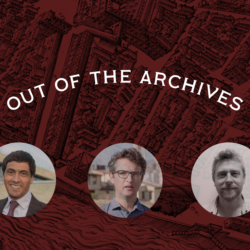A year in apps is a decade in most other industries.
At this time of year, it’s therefore always interesting to sit back and take stock of our industry and where it’s headed.
So what were our key moments in smartphone and app tech this year?
January
- In Rotterdam, local authorities unveiled plans to make the Netherlands’ largest port the most interconnected city in the world. Working with IBM, authorities set out their blueprint for a cloud-enabled, IoT-driven smart port driven by ‘digital dolphins’ – smart buoys which track water, weather and communications data, and pre-order replacement parts from dockside 3D printers. In doing so, the city hopes to cut ship wait times, speed up repairs and automate management of the port.
- Meanwhile, the effects of Apple’s campaign to ‘clean up’ their App Store began to bite, with many developers unable to publish software to the store. US Congress eventually had to wade in on the issue, which continues to affect the industry.
February
- In London, Professor Andrew Blake opened the Alan Turing Institute’s February symposium with a wide-ranging study of the biggest challenges faced by modern societies, and how AI can be used to solve them. Drawing on the conference theme – ‘AI for Social Good’ – Blake’s keynote made the case for ethics-first thinking in all AI development, while other speakers dug into topics including predictive bias, AI learning environments and the importance of human insight for effective design.
- Google launched their ARCore platform – designed to simplify development of augmented reality experiences on mobile. In the first month, more than 60 apps were launched with the platform, including Which Box from eBay, which helps sellers to identify the correct box to ship their items.
March
- In March, Brussels’ Innovation and Cultural Heritage Conference put digital transformation under the microscope. Joining experts in tech, the arts, heritage and archaeology, Mariya Gabriel, EU Commissioner for Digital Economy and Society, and Tibor Navracsics, EU Commissioner for Education, Culture, Youth and Sport, made the case for digital curation in museums – but only ‘in support of’, and not in competition with ’real-life’ experiences.
April
- The British Library in London hosted the Ambient Literature Festival, wrapping up a year of collaboration between Calvium with Bath Spa University, the University of Birmingham and UWE. The project explored new possibilities at the intersection of literature, location and technology. Read all about it here.
May
- May saw this year’s iteration of Google I/O – the tech giant’s annual developer conference. Among the most exciting announcements was that of the launch of Google Duplex – an advanced conversational AI tool that will revolutionise how we use smartphone assistants (or become another battery-sapping plaything.) Meanwhile, Google Maps was expanded for developers – offering API access to incorporate location-based features into their apps.
June
- Apple were hot on Google’s heels, holding their WWDC (Worldwide Developers Conference) this month. iOS 12 was the topic of discussion. Lacking the flashiness of previous operating system updates, this iteration was focused on improving behind-the-scenes performance. Features included reminders to encourage users to spend less time on their phones and the ability to add information to Siri via Shortcuts. Most exciting for us were the ARKit 2.0 updates for developers.
- The Battersea Power Station Redevelopment Company were proud to launch their app – which we designed and built – at the London Festival of Architecture, hosting a panel on the future of digital placemaking for a mixed group of building, planning and local government professionals.
August
- Google Pie launched for Google Pixel users – with all Android devices to follow suit. While the tech giant baked in many new AI features, most interesting were those designed to give users greater control over the time they spend using their device – including an app-blocking feature that prevents you using apps over a certain time limit, and an option to remove notifications from the lock screen completely.
- Here at Calvium, we launched our comprehensive guide to digital placemaking – pouring everything we know into a one-stop shop for heritage, regeneration and local government professionals. Access it here.
September
- September was a bad month for Facebook. First, Instagram founders Kevin Systrom and Mike Krieger left the company, having sold their app to the firm back in 2013. Zuckerberg’s investment in the photo-sharing platform has paid off handsomely – growing from 30 million to 600 million users since acquisition – but the pair apparently felt uncomfortable with their parent firm encroaching on their independence.

- As if that wasn’t bad enough, Facebook also admitted that up to 50 million users’ data could have been compromised in a serious leak.
October
- Blockbuster game Fortnite came to Android – having been downloaded more than 100 million times in 5 months on iOS. Controversially, publisher Epic Games chose not to allow the app to be downloaded from the Google Play Store – a decision which meant they avoided Google’s 30% download fee, but exposed users to clone versions of their software.
- Google+ finally closed for consumers, after 7 years and reaching a peak 111 million users (against Facebook’s 2.23 billion in February 2018). The deathblow? A data leak that allowed developers to access users’ data and their friends’ data.
- Now, perhaps the most important entry on this list. In October, Snapchat added filter functionality for users’ cats. Miaow.
November
- App psychology – especially how smartphone software ‘hooks’ users – was a hot topic throughout 2018. In November, Facebook and Instagram followed Google’s lead and rolled out ‘time spent’ features on both platforms, to help users keep their social habits under control.
- Over at Apple, WatchOS 5 was launched – a much improved operating system that gives developers access to Siri within the device. This was a big step forward, given the important role that voice activation plays on a device with such a screen – which can be fiddly to operate by hand.
- At Calvium, we launched our comprehensive guide to mobile technology – an essential resource for teams considering building their own app, with info on app technologies, key questions to answer before investing in a project and a breakdown of the development process. Find it here.
- Finally, Niantic released Ingress Prime – a new, completely reworked version of Ingress. Niantic are the team behind Pokémon Go. And while the latter is what put them on the map for many of us, Ingress – a location-based adventure game – delivered breakthrough gaming moments of its own, many of which we foresaw in our pre-Calvium days at HP Labs.
So there you have it: our favourite moments from a year in apps. Now if you don’t mind, we’re going to play Ingress Prime. Happy new year!
Enjoyed this piece? Join our monthly newsletter for expert app insight and news straight to your email inbox.








